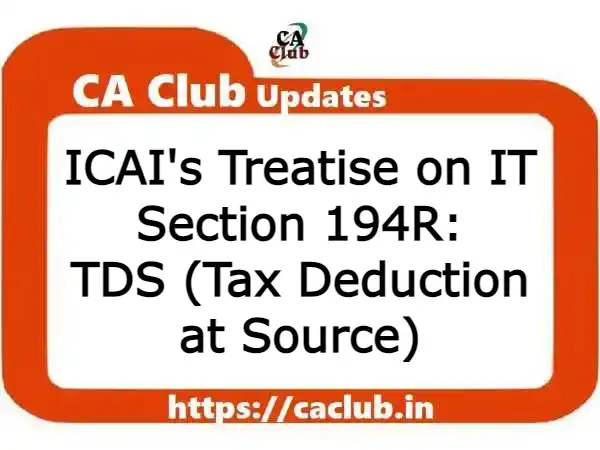TDS (Tax Deducted at Source) is a mechanism used by the government to ensure that income tax is collected at the point of income generation. The Income-tax Act 1961 contains various provisions for TDS on various types of payments. The government recently introduced a new TDS section 194R in the Budget 2022-23 to provide more clarity on transactions that were previously taxable but unreported. To help professionals and taxpayers understand this new provision, the ICAI’s Direct Taxes Committee published a “Treatise on Section 194-R under the Income-tax Act, 1961.”
The article goes over the fundamentals of TDS, including the deductor and deductee, as well as the significance of the new TDS provision, Section 194R. It also discusses the benefits and privileges provided by corporations to their employees, partners, distributors, and so on, and how this new provision will necessitate the reporting of such transactions.
What exactly is TDS and who are a deductor and a deductee?
TDS is a system incorporated into the Income-tax Act for the quick and efficient collection of taxes. It requires a person (deductor) who is required to make a specified payment to another person (deductee) to deduct tax at source and remit it to the Central Government. The deductee whose income tax has been deducted at source is entitled to credit for the amount deducted on the basis of the deductor’s Form 26AS or TDS certificate.
TDS is a system of tax deduction at the point of income generation. This system deducts tax at the point of income generation. The payer deducts tax and remits it directly to the government on behalf of the payee. Currently, the provisions of tax deducted at source apply to a variety of payments such as salary, interest, commission, brokerage, professional fees, royalty and so on.
In the case of certain prescribed payments (e.g., interest, commission, brokerage, rent, etc.), the payer must deduct tax at source (TDS) at the prescribed rate. The payer is known as a deductor, and the payee who receives the net payment is known as a deductee.
Understanding Section 194R
The government specified a new TDS section, Section 194R, under the Income-tax Act 1961 in the Budget 2022-23. The new TDS provision requires anyone who is responsible for providing any benefit or perquisite to a resident to deduct tax at source at a rate of 10% of the value or aggregate of value of such benefit or perquisite prior to providing such benefit or perquisite. This was implemented to require reporting of such transactions and allow the government to recover taxes where applicable.
What is the significance of Section 194R?
Employees, business partners, channel partners, distributors, and others are frequently offered benefits or perquisites by corporations. Under Section 37 of the Income Tax Act 1961, these benefits/perquisites are claimed as expenses of the cost/value of the benefits/perquisites provided. However, because these transactions were frequently outside of government records, there was no way to check on them. Section 194R was added to the statute books to require such transactions to be reported. The recipients of benefits/perquisites will be reported using this section, and the government will be able to recover taxes where applicable.
Doctors, for example, receive free samples and travel tickets from various pharmaceutical companies. The pharma companies pay for the tickets because they are business promotion costs, and the companies can claim them under Section 37 of the Income Tax Act 1961 because they are related to the business. Doctors’ benefits/free tickets, on the other hand, are taxable under Section 28, i.e. as business income.
The company charges/claims the cost of the benefits/perquisites, resulting in tax savings. However, because there was no tax deduction or reporting by the companies, it is impossible to determine whether the doctors offered the same as income. The underlying concept of Section 194R was to have these benefits/perquisites reported and to encourage tax collection from those who received them.
The addition of Section 194R to the Income-tax Act 1961 is a step forward towards greater transparency in transactions involving benefits or perquisites provided by businesses to employees, partners, distributors, and others. The new TDS provision requires anyone who provides any benefit or perk to a resident to deduct tax at the source. This will allow the government to recover taxes from perquisite/benefit recipients, thereby increasing tax collections.
ICAI Guidelines: Section 194-R Treatise
The Direct Taxes Committee of the ICAI has published “Treatise on Section 194-R under Income-tax Act, 1961” to assist professionals in understanding and providing a basic understanding of Section 194R and other related valuable information.
The ICAI’s publication “Treatise on Section 194-R under the Income-tax Act, 1961” is a valuable resource for professionals to better understand and comply with the provisions and procedures. The publication provides members with quick guidance on the subject as well as other related information, allowing them to better understand the new provision.
Conclusion
In conclusion, by including Section 194R in the Income-tax Act 1961, the government hopes to increase tax collections from recipients of benefits or perquisites. The ICAI’s publication on this new provision will help members comply with the provisions and procedures in a more objective manner. To avoid penalties or legal ramifications, taxpayers must ensure that they follow the TDS provisions.
ICAI’s Treatise on IT Section 194R: TDS (February 2023)
